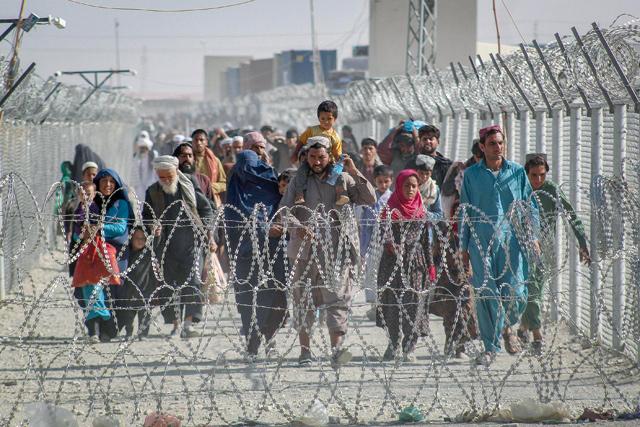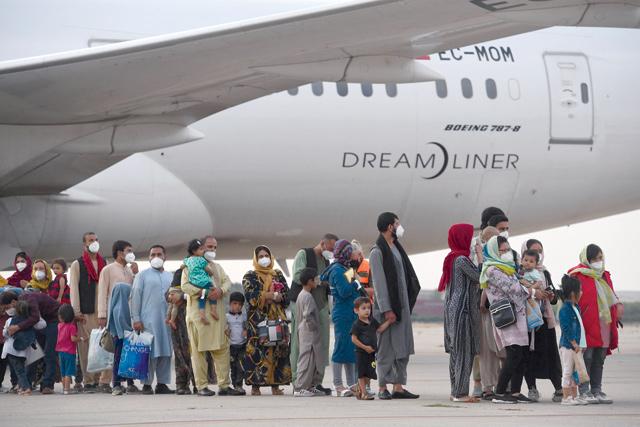You are here
Afghanistan brain drain complicates Taliban rule-- experts
By AFP - Sep 02,2021 - Last updated at Sep 04,2021
PARIS — Many of the more than 120,000 people evacuated from Afghanistan are qualified professionals from civil servants to lawyers, a brain drain that will affect the Taliban's ability to rule, experts say.
During the airlift from Kabul led by the United States and other Western countries, people who had worked with the US-backed government as well as NATO forces were prioritised, along with anyone who had reason to fear the new Islamist regime.
This included bureaucrats, bankers, people who had worked for NGOs, civil society activists, journalists and other graduates who formed the backbone of the former Afghan state and society that was corrupted by the West in the eyes of the Taliban.
"I never wanted to leave my country, to start from scratch someplace else," Rachid, a former senior civil servant in Kabul, told AFP in France where he is seeking asylum along with his wife and child.
"In Afghanistan, I had everything: job satisfaction, 50 people under my supervision, social prestige. But more importantly, what I was doing was useful for the Afghan population," said the 40-year-old graduate who has a masters degree from a European university.
He asked not to be identified with his full name or with his university out of fear of reprisals for his family back home.
"The 30 or 40 people who studied with me abroad all left. It is a big loss for our country," Rachid said.
After years of suicide bombings and targeted killings, people like him dismissed out of hand attempts by the Taliban leadership to reassure them they would be safe and free to continue working.
Governance problems
The losses for one of the world's poorest countries are considerable and will complicate the ability of the Taliban to run the country, experts say. The Taliban appeared to realise this, with a spokesman accusing America of removing "Afghan experts" on August 24, a week before the airlift ceased.
"We ask them to stop this process," spokesman Zabihullah Mujahid said at a press conference in Kabul. "This country needs their expertise. They should not be taken to other countries."
Frederic Docquier, a migration expert at the Luxembourg Institute of Socio-Economic Research (Liser), said the exodus from Syria in 2015 included many of the country's skilled workers, with the more educated always over-represented among migrants.
"We dont know exactly the composition of the Afghan refugee outflow, but when there is a crisis in a country... the percentage of educated people among asylum seekers is higher than in the population of origin," said Docquier.
Michael Barry, a specialist on Afghanistan who taught at the American University in Kabul, said that many members of the Taliban are from rural areas and lack the know-how and education to run the state bureaucracy. "The know they need a minimum of technicians, of highly educated people, to keep the wheels turning of an administration that needs to keep taking in international aid, even if it is only Chinese, Pakistani or Qatari," he explained.
"Up until now they viewed their supreme responsibility as destroying the country and causing the break up of the adminstration. That's why they were financed by Pakistan," he said.
Intellectuals
Given the potential impact on their new regime, why did the Taliban allow so many people to leave with the assistance of their sworn enemy, the United States?
"They are seen in a more positive light by the international community by making this concession and they get rid of possible sources of opposition at the same time," explained Barry.
"Brainpower also means criticism and free-thinking," he added, recalling the case of Fidel Castro who let thousands of people -- "worms" he called them -- leave Cuba after his revolutionary takeover in 1959.
"The intellectuals in any highly repressive society are a source of opposition. When you let them go, you remove the potential for opposition and therefore of change," said Docquier.
Many exiles maintain links with their country of origin and help develop trade and two-way investment over time.
But if the Taliban revert to the style of their brutal 1996-2001 rule, with its virulent anti-Western propaganda, today's Afghan exiles risk making a long-term break with their country of origin.
"I saw 30 years ago the dramatic impact on my own country, Somalia, which has many things in common with Afghanistan: civil war, a tribal society..." said Ali H. Warsame, a teacher at the East Africa University in Nairobi, Kenya.
"I left in 1990, the year I graduated and it took me 20 years before I returned," he said.
Related Articles
KABUL — The Taliban on Tuesday said they would not agree to an extension of a looming deadline to evacuate Afghans from Kabul airport, even
KABUL — Afghans on Wednesday faced an increasingly desperate race to escape life under the Taliban after President Joe Biden confirmed US-le
WASHINGTON — The United States has airlifted out of Afghanistan some 7,000 people since August 14 as the Taliban appears to be cooperating w















